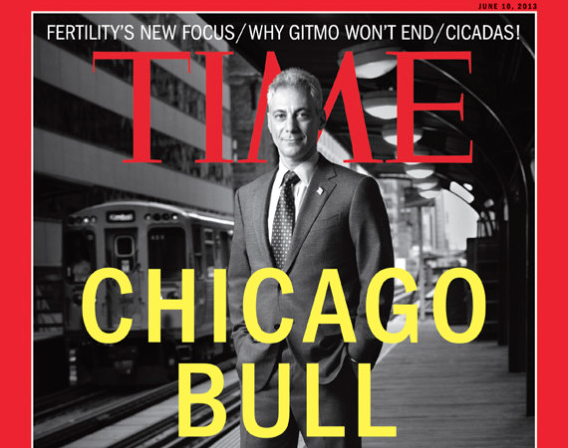Mayor Rahm Emanuel, at the helm of arguably the most corrupt city in the nation, has an image challenge. He has created enemies left, right, and center in the name of budget cuts while racking up spending on pet projects for the 1% like a maze of protected bike lanes through the city. His notorious temper and connections to the embattled Obama “Chicago Way” Administration risk forever tainting his turn in charge.
Enter Time magazine, whose June 10 cover story on Chicago Mayor Rahm Emanuel presents a controversial figure who, though under attack, is made of heroic mettle, and therefore impervious to petty questions about school closings and massive government expenditures. No, with Time‘s help, Rahm will be protected by the media in the same way so many others before him have: through a sort of enshrinement afforded to a “character” like him.
Time‘s piece, “Rahm’s Kind of Town,” opens by posturing Emanuel in a battle of biblical and epic proportions against fellow Democrats, comparing it to the likes of “Cain and Abel, the Yorks and Lancasters, and Michael and Fredo Corleone.” The latter is perhaps a nod to his nickname, the “Godfather.”
The Time piece is replete with references to his “Godfather” image, referring to him as “the guy who has picked the fights his predecessors avoided.” Time‘s cover is equally bold, presenting him as a tough guy in black and white, dominating the gritty city scene behind him.
Mayor Daley was always said to “get the roads plowed,” and with this, he was issued a monumental pass for his mobster-like rule over the city. A tactic that worked, and that Rahm appears to be pursuing aggressively.
Time provides a factual account of the trials and tribulations of Emanuel’s first two rocky years, from the seven-day teacher strike in 2012, record-high homicides and violence, to the furor of black communities against him, so many of whose children’s schools are shuttered by the Mayor’s School Board. However, Time misses a beat when it comes to dealing with devastation and ongoing plight in Chicago’s poorer-urban-black communities, and the foreclosure housing crisis within.
Rahm must be more than aware that positioning himself as making epic decisions will work to his advantage, telling Time: “the decisions we make in the next two to three years will determine the face of Chicago for the next 20 to 30 years.”
Decisions like his massive infrastructure plan “Chicago Forward,” funded by a public-private trust, which is estimated to reach at least $7 billion as the city faces an annual $650 million deficit under his management.
Time moves from detailing the tough decisions Rahm faces to setting him up as even worthy of consideration for the highest office in the land. Time questions the Mayor on whether or not he will run for president, to which he responds, “No. I’m not. Never. It is not happening. I don’t know how else to say it. No.”
“I’m done with that,” he said of Washington’s gridlock and posturing. “I worked eight years in the White House for two great Presidents. They talk about things they want to do–I’m doing it. This is the happiest I’ve ever been in public life. I’ve always wanted to be mayor.”
Never mind the fact that in no way would any Democrat operative in their right mind impose yet another Chicago wastrel on the nation at this time; this is about setting Rahm up as a heavy hitter, a man who turned down the presidency of the United States, no less.
Throughout the piece, Time continues to beat the presidential drum, referring to Rahm’s presidential qualities that “evoke Clinton, in the way he rattles off statistics… and like Clinton, he knows how to schmooze to get what he wants.” Time continues [emphasis mine]:
At the same time, he has taken on some very large issues, the kind Presidents give speeches about: education reform, job creation, unsafe streets. Revealing the stripes of a pragmatic, pro-business New Democrat, the mayor lengthened the school day for Chicago’s elementary and high school students, reorganized the city’s enormous system of community colleges to emphasize job-skills training and established an infrastructure trust to allow private investment in public-works projects. All of these are popular ideas among some Democratic policy mavens, but no other mayor has taken them so far, so fast.
Rahm says he “is a wonk trapped in a hack’s body.” This, Time posits, “blends into a 21st century version of the classic urban boss,” alluding to time spent working for former Chicago Mayor Richard Daley, who was known for continuing the legacy of his father Richard J. Daley’s “political machine,” which others called an organized crime syndicate.
If Rahm is seeking the same media protection Daley received, his description of a very Daley-like tactic will help things along. He explained to Time how he got Chicago universities to partner with local high schools:
“Each of those college presidents has construction projects they want to complete,” he explains. “I just told them if they would help me, I’d have someone walk their plans through the permit process.” They all assented, though he didn’t have to say what might happen to those permits should they refuse.
Time finishes off its piece with a quote from the Chicago mobster movie, The Untouchables: “you wait until the fight is over. One guy is left standing. And that’s how you know who won.”
Perhaps you wait to see who writes the story of who won, and that’s how you know just how far Chicago’s tentacles have reached. Witness: Time.

COMMENTS
Please let us know if you're having issues with commenting.